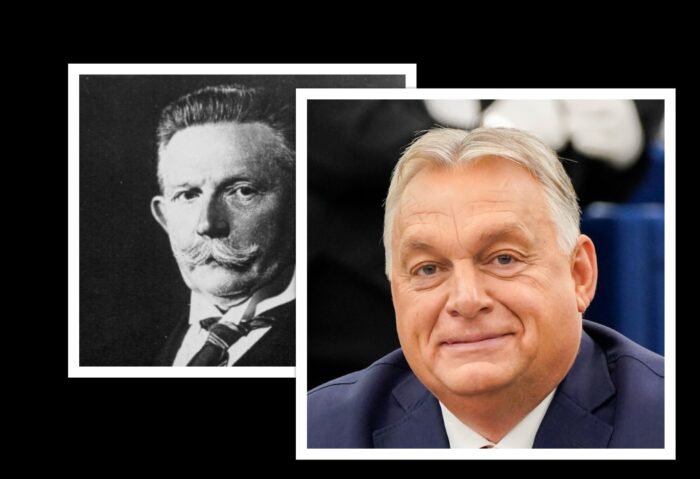The Global Influence Operations Report (GIOR) is pleased to present Part 1 of our series on the threat posed by the Global National Conservative Alliance (GNCA):
The Global National Conservative Alliance (GNCA) is a political movement that unites right-wing and far-right factions worldwide under the banner of national sovereignty, cultural preservation, and opposition to global governance. By rejecting liberal internationalism and globalist economic policies, the GNCA promotes protectionism, strict border control, and traditional social values. This shift marks a break from the free-market ideals of Reagan-era conservatism, aligning instead with populist nationalism. The election of Donald Trump as US President has vastly increased the threat of the GNCA to Western democracies, as MAGA-style nationalism has become a unifying force for right-wing movements on both sides of the Atlantic.
The GNCA’s influence is amplified through high-profile events such as the National Conservatism Conferences and the Conservative Political Action Conference (CPAC), which bring together European far-right leaders, American conservatives, and other global figures to advance a shared ideology and strengthen transnational ties. Hungary, under Viktor Orbán, has emerged as a central node in this alliance, acting as a bridge between European and American nationalists and hosting international conferences that feature prominent speakers from both sides of the Atlantic. Institutions like the Mathias Corvinus Collegium (MCC) in Hungary serve as hubs for right-wing intellectuals and further entrench Hungary’s role as a model for the global right.
Threats to Democracy from the GNCA
Erosion of Checks and Balances
National conservatism and the Global National Conservative Alliance (GNCA) pose significant risks to the foundational structures of democratic governance. As these movements gain influence, they often seek to centralize authority and weaken the system of checks and balances. This is seen in the erosion of the independence of critical institutions such as the judiciary and the media, which are essential for maintaining transparency and accountability. For example, in countries like Hungary, recent “sovereignty protection” laws have targeted journalists, political opponents, and non-governmental organizations that receive foreign funding, thereby undermining democratic oversight and pluralism.
Patronage and Corruption
GNCA-aligned governments frequently establish patronage networks that redistribute resources to political allies. This practice not only consolidates power among a select group but also erodes the principles of fair governance and equal opportunity. Over time, such systems foster corruption and diminish public trust in government institutions, making it increasingly difficult to hold leaders accountable and to ensure that public resources are used for the common good.
Disinformation and Influence Operations
A particularly alarming aspect of the GNCA’s strategy is its sophisticated use of disinformation and influence operations. These movements have developed extensive propaganda networks that utilize both traditional and social media platforms to shape public opinion, discredit opposition voices, and promote nationalist and exclusionary narratives. By targeting vulnerable populations with conspiracy theories and identity-based fears, they deepen societal polarization and create fertile ground for authoritarian regimes to exploit these divisions and destabilize democratic systems.
Marginalization of Minorities and Erosion of Social Cohesion
The rhetoric and policies promoted by the GNCA also contribute to the marginalization of minority groups and the erosion of social cohesion. Their emphasis on exclusionary identity politics and cultural homogeneity often comes at the expense of inclusivity, equality, and the protection of individual rights. Attacks on the independence of the press, the judiciary, and political opposition are common, with critics frequently being framed as threats to national security or cultural identity. This environment facilitates the normalization of authoritarian tendencies, where political violence and the rejection of electoral outcomes become increasingly acceptable.
Undermining Global Cooperation and Democratic Principles
Finally, the GNCA’s antagonism toward global institutions and elite power structures not only weakens international cooperation on critical issues such as climate change, security, and human rights, but also undermines the foundational principles of liberal democracy. While the movement’s focus on national sovereignty and traditional values may resonate with segments of the population seeking to preserve their cultural identity, its trajectory poses serious challenges to the principles of equality, inclusivity, and democratic governance that underpin open societies.
The GNCA- A Target for Foreign Influence and Information Warfare
The Global National Conservative Alliance (GNCA) has become a significant target and channel for foreign influence, particularly from authoritarian regimes such as Russia and, increasingly, China. These regimes recognize the GNCA’s ideological hostility to multilateralism and global governance as an opportunity to undermine democratic institutions, sow division, and advance their own strategic interests.
Russia has been especially active in exploiting the GNCA’s networks to spread disinformation and amplify narratives that weaken trust in democratic institutions. The GNCA’s emphasis on national sovereignty, skepticism of international cooperation, and distrust of mainstream media provides fertile ground for foreign actors to introduce and amplify conspiracy theories, anti-establishment rhetoric, and divisive identity-based narratives. Russian operatives have used digital platforms, including social media and encrypted messaging apps, to target GNCA-aligned audiences with tailored content designed to deepen polarization and erode confidence in electoral processes.
Foreign influence is not limited to online disinformation. Russia and China have also sought to cultivate relationships with GNCA-aligned leaders and organizations, offering financial support, strategic guidance, and access to state-backed media. In some cases, these regimes have provided logistical assistance for GNCA events or helped amplify their messages through state-controlled outlets. The result is a symbiotic relationship: the GNCA benefits from the resources and reach of authoritarian regimes, while those regimes gain a foothold in Western democracies, allowing them to shape narratives and undermine democratic norms.
The impact of these foreign influence operations is profound. By exploiting the GNCA’s networks, foreign actors are able to amplify anti-democratic rhetoric, marginalize minority voices, and destabilize democratic institutions. The GNCA’s alignment with authoritarian regimes normalizes undemocratic practices and weakens the resilience of open societies. Over time, this dynamic erodes public trust, fosters political instability, and makes it increasingly difficult for democratic societies to respond effectively to global challenges.
US MAGA, Donald Trump, & the GNCA
The MAGA (Make America Great Again) movement, forged around Donald Trump’s political rise in 2016, is a distinctly American expression of the GNCA. It champions national sovereignty over international cooperation, favors protectionist trade measures, and promotes a culturally exclusionary vision rooted in “Western civilization” and traditional family structures. Central to the movement is a stringent anti-immigration stance, with policies that limit asylum, build physical barriers, and frame immigrants as cultural threats. MAGA opposes progressive reforms such as diversity and inclusion programs, LGBTQ+ rights, and gender nonconformity, advocating instead for a return to a 1950s-style moral order. The movement emphasizes an “America First” doctrine in foreign policy, increasing defense spending while criticizing multilateral institutions.
MAGA’s tactics and rhetoric pose significant threats to democratic institutions in the United States. The movement seeks to delegitimize independent media by branding critical outlets as “fake news” and promoting its narrative through tightly controlled social media channels. This pattern mirrors the broader GNCA strategy of undermining trust in institutions and amplifying division. MAGA consistently advances policies that favor corporations, religious conservatives, and a militarized national identity, further polarizing society and eroding social cohesion.
Like other GNCA-aligned movements, MAGA leverages grassroots mobilization—especially through social media and live events—to build loyalty and challenge democratic norms. Over time, allegiance to the movement can eclipse allegiance to laws or constitutions, clearing the way for leaders to centralize power as the only legitimate voice of the people. MAGA’s “us vs. them” rhetoric targets the “deep state” and liberal elites, turning public distrust into a political weapon and justifying authoritarian control under the guise of national restoration.
The movement’s ideological and operational links with the GNCA have made it a prime target for foreign influence operations, particularly from Russia and China. These foreign actors exploit MAGA’s skepticism of international cooperation and its embrace of conspiracy theories to amplify divisions, sow distrust in elections, and undermine confidence in democratic outcomes. The result is a feedback loop that threatens the integrity of elections, public discourse, and the ability of democratic societies to respond effectively to global challenges.
Recent European Elections and the GNCA
National Conservatism and Transatlantic Alliances
National conservative and far-right parties have surged in influence, with movements like the Alternative for Germany (AfD), the Dutch Party for Freedom, and Poland’s Law and Justice-aligned candidates gaining ground. These parties are increasingly networked through events such as the National Conservatism Conferences and the Patriots for Europe rallies, where leaders like Hungary’s Viktor Orbán and France’s Marine Le Pen have called for a united front against EU integration and liberal democratic norms.
Foreign Influence and Digital Campaigns
Russian influence operations have evolved beyond traditional disinformation, targeting Central and Eastern European elections with sophisticated digital campaigns designed to exploit societal divisions, depress voter turnout, and strengthen populist forces aligned with Russian interests. In Romania, far-right candidate George Simion surged to frontrunner status through coordinated digital campaigns and social media manipulation, with nearly a quarter of Romanian-language Telegram channels promoting national conservative and Kremlin-aligned messaging.
Despite these efforts, the impact of foreign interference has varied. In Poland, robust countermeasures and a diversified social media landscape blunted the effectiveness of Russian campaigns, resulting in much lower levels of disinformation than anticipated. In Romania, despite the GNCA’s mobilization and Russia’s hybrid tactics, voters ultimately rejected the alliance’s anti-EU, anti-NATO agenda, reaffirming support for pro-European governance.
Outcomes and Implications
While the GNCA and its allies have achieved notable electoral gains, their success has not been uniform. The rise of the GNCA and its alignment with foreign influence operations pose a significant threat to European unity, democratic norms, and collective action on issues like security and climate policy. The GNCA’s ability to exploit digital vulnerabilities, amplify divisive narratives, and forge transnational alliances has reshaped the political landscape, challenging the EU’s integrationist agenda and raising concerns about democratic backsliding and institutional capture.
Broader Implications of the GNCA Rise
The rise of the GNCA is not an isolated phenomenon but part of a global trend toward nationalism and populism. Its growing influence challenges the liberal democratic order and offers an alternative vision that prioritizes identity, tradition, and sovereignty over multilateralism and integration. This shift carries profound risks, including the undermining of global cooperation, the empowerment of authoritarian regimes, and the erosion of social cohesion. The Global National Conservative Alliance represents a significant threat to democratic order, both domestically and internationally.
Its emphasis on national sovereignty, traditional values, and opposition to global governance has resonated with voters disillusioned by globalization and governance failures. However, the movement’s reliance on disinformation, patronage, and alignment with authoritarian regimes poses serious risks to democratic institutions, social cohesion, and global stability. As the GNCA continues to grow, it will be essential for democratic societies to defend their values, strengthen their institutions, and counter the spread of disinformation and foreign influence.
GIOR References
- Russian Influence on Central European Elections: Disinformation to Democratic Erosion
- Hungary’s Transparency Law Targets Orbán Critics
- Russian Influence in Poland: Kremlin’s Election Plot Exposed
- GIOR REPORT: New Alliance Between US Conservatives and European Nationalists—An Opportunity for Russian Influence?
- CPAC Hungary 2023: A Showcase of the Global National Conservative Alliance
- The Polish Election & Russian Interference: Expected Storm Never Arrives
- Russian Attempts to Gain Leadership of Global National Conservative Alliance Running Into Snags
- European Far-Right Leaders Flock to CPAC to Build MAGA-Inspired Alliance
- Orban & Le Pen Blast EU at Patriots Europe Rally in France – National Conservative Vision on Display
- The National Conservative Roots of Romania’s New Political Star
- Slovakia’s Election Showcases Danger of Russian Influence Operations
- Russian Influence on the Romania Election: Kremlin Tactics and the GNCA
- MAGA Intellectual Coalition Fractures Over Anti-‘Woke Right’ Infighting
- Trump & Hannity Spread Iran Bombing Disinformation
- Echoes of Revival: MAGA, the Muslim Brotherhood, and Italian Fascism
For Part 2 of this series — How Close Is National Conservatism to Fascism? (Series Part 2 of 3)
For Part 3 of this series- National Conservatism’s Weimar Echo (Series Part 3 of 3)










